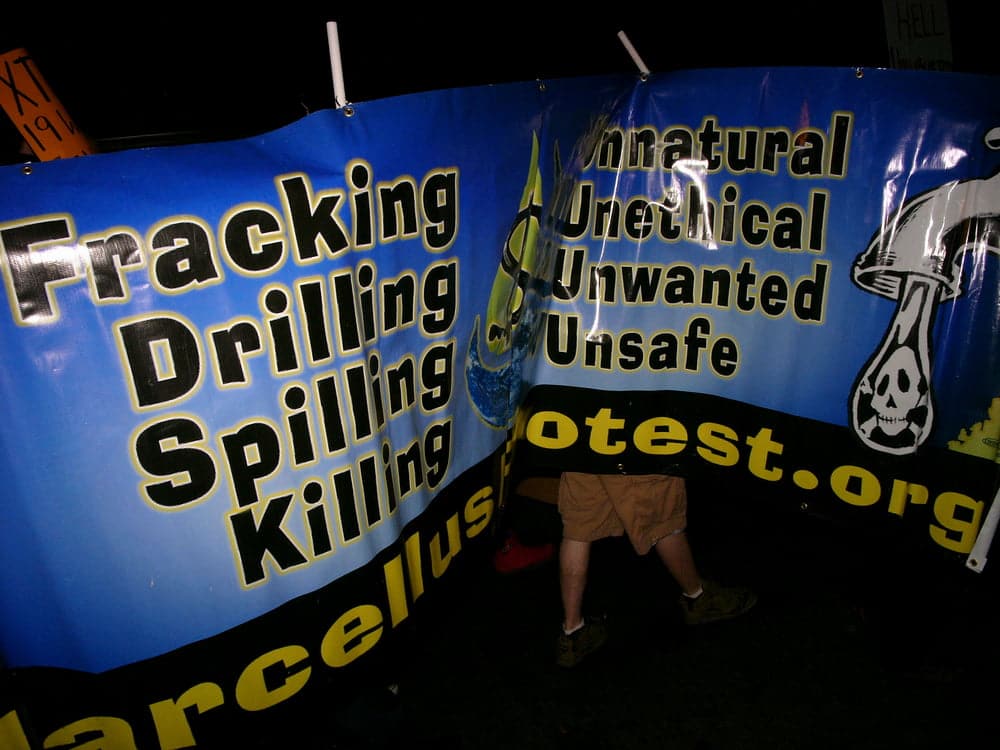Question: What toxic waste threatens the Delaware River and beyond because regulations ignore its hazardous properties?
Answer: Wastewater produced by fracking.
But there may be hope.
Democratic Senator Katie Muth (SD-44) introduced Senate Bill 28, groundbreaking legislation that would define the wastewater produced by fracking for what it truly is – hazardous. Senator Muth has been trying to get the highly toxic and radioactive wastewater that results from using hydraulic fracturing (“fracking”) to extract natural gas from drilled wells to be classified as hazardous for some years.
However, she isn’t alone in her concern that these wastes threaten clean water and human health – people in Pennsylvania and here in the Delaware River Watershed, as well as from across the nation, have been calling for this waste to be classified as hazardous. In fact, New York State has already passed a law ordering it to be regulated as hazardous.
Years ago the federal government granted the exemption from hazardous waste laws to the gas and oil industry to allow drillers to cut costs. But the dispensation has led to the improper storage, transport, and disposal of the fluids and solid waste generated. Today these wastes can go to regular landfills and treatment facilities, can be injected into deep wells, can be used to cool power plants and manufacture everyday products. Some of this waste can even be spread on roadways as a deicer and dust suppressant.
But the toxic chemicals in fracking fluids, the radioactive and heavy metal-laden “produced” water that comes up from the gas well after fracking, and the extremely high salt content can pollute waterways and groundwater, destroy aquatic life and habitats, and can devastatingly harm human health. Studies on the dangers of fracking and its wastewater are being published; one recent study out of the University of Pittsburgh School of Public Health concluded that children who lived within 1 mile of a fracked well had “5 to 7 times the chance of developing lymphoma, a relatively rare type of cancer, compared to children who lived in a place with no wells within 5 miles.”
The Delaware River Watershed provides drinking water for up to 17 million people, including 1/3 of New Jersey’s water supply and 8 million Pennsylvanians. Delaware Riverkeeper Network and a four-state Coalition worked for 10 years to get fracking banned in the watershed, before finally achieving it in 2022. We went on to fight for a ban on the import of fracking wastewater into the Basin, which resulted in the Delaware River Basin Commission prohibiting the discharge of fracking wastewater to water and land, which is essential, but they did not ban its importation. We continue to wage our campaign to achieve a full ban. It simply doesn’t make sense to ban fracking but allow its wastewater pollution to come here.
The classification of fracking wastewater and solids as hazardous would force limits on the handling and disposal of the materials, protecting drinking water and the environment. Pennsylvanians need to contact their elected state representatives and senators to tell them to support this legislation. Without a huge outpouring of support, the prospect of the legislation being adopted is not great in Pennsylvania – the second greatest producer of natural gas in the nation and a state that has fully embraced fracking, despite the indelible harm to public health, communities and the environment. But we must start somewhere and Katie Muth is not giving up – and neither are those of us who are fighting to prevent fracking pollution.







